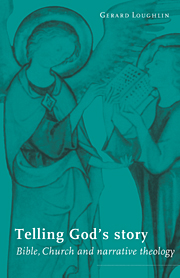5 - True stories
Published online by Cambridge University Press: 24 August 2009
Summary
Narrativist theology sets the Scripture before us as a consuming text; or better, as a text to consume in order that we might grow in the strength and shape of Christ. We are not so much enjoined to get inside the text, as to let the text get inside us, so that we are nourished by its word and enabled to perform its story. However, the story of the text is about a particular person – Jesus of Nazareth – and about God incarnate in that person. Thus the story has both an historical and a transcendent reference, and it is the possibility of such reference that many think narrativist theology calls in question, with its stress on the story against anything behind or in front of it. How does the Bible refer to God in Christ? How is it a true story?
NARRATIVE WORK
Narrative, for the philosopher Paul Ricoeur (born 1913), is that work which renders experience significant, humanly meaningful. Without the work of narrative, experience would be only successive occurrence, one thing after another. Through the work of narrative it is given structure and form. As the term ‘work’ suggests, narrative here is not a thing but a process, not so much a noun as a verb. It is dynamic rather than static; a movement that transforms its elements into a unity or whole. Ricoeur's terms for this work of narrative are ‘emplotment’ and ‘configuration’, and they mark what Kevin J. Vanhoozer has called ‘Ricoeur's great discovery about narrative, its configurative dimension’.
- Type
- Chapter
- Information
- Telling God's StoryBible, Church and Narrative Theology, pp. 139 - 176Publisher: Cambridge University PressPrint publication year: 1996
- 1
- Cited by



